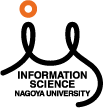Basic Philosophy, Education, Research, History

Basic Philosophy
Along with the spread of the information society, “Information” has itself become a vital part of our current lives ranking alongside materialistic things and energy as important elements that make up our human society. The Graduate School of Information Science will treat “Information” as a study approached from the diverse perspectives of engineering, natural science, computer science, human science, social science, cognitive science and life science with the aim of creating an entirely new field that integrates existing studies. The Graduate School has the educational goal of training researchers, high-level specialist engineering professionals and instructors needed in our information society. A yet further and deeper educational goal is the fostering of individuals having a deep core of academic knowledge and top-ranking capabilities needed for holding their own in an occupation requiring a sophisticated level of expertise acquired by education and research into both the theoretical and applied aspects of our information society, as well as able to contribute to a richer culture. The basic policy of the Graduate School is not only developing human talent capable of carrying out cutting edge research on the frontiers of information science, while having a sense of societal ethics through understanding the interaction of society and culture; but also to engage in systematic instructional and research efforts that incorporate diverse new efforts and approaches.
Education
It is expected that “information” studies will continue to develop in parallel with various other academic fields it concerns. For this reason, we accept students from various majors and backgrounds. This is because the goal is to include a wide range of students in the work team from basic to applied information sciences. Our educational program takes place according to the following policy.
- Education of systematic and practical learning for major fi elds in information science.
- Education to actively learn advanced expertise to study the depths of information science.
- Education to acquire thinking skills and execution skills to research emerging issues in information science.
- Education to acquire skills to understand and analyze real-world issues and demands.
- Education of ethics and social standards in communica-tion skills, expression skills, and information society.
As it is apparent, this program not only focuses on advanced studies and research on information science.
Common graduate courses to learn the fundamentals as an information science graduate and coursework to learn specialized academic fundamentals are offered.
In addition, OJL educational training through an academic-industry collaboration, which is the result of the “Leading Information Technology Professional Fostering Program” of the Ministry of Education, Culture, Sports, Science and Technology, and research internships that give the opportunity to experience the research-and-development operations in a company are off ered as well.
OJL: On the Job Learning
Research
Five interdisciplinary departments constitute the Graduate School of Information Science, whose goal is expanding the horizons of information science. Our research area incorporates a wide range of disciplines as seen below.
- Mathematical systematization and computation models.
- Practical systems to meet globalization needs.
- Collaboration of human and machines through expression and understanding of information.
- Interactions between individuals in natural and artificial phenomena.
- Intellectual activities that merge real and virtual societies.
Our research results have been published and presented in international and domestic reputable scholarly journals and conferences, where they have been highly praised. This is confirmed by the many awards granted our school and frequent invited talks by our staff. We are also active in raising funds from external sources to continually promote research studies. These funds are available in various forms such as Grant-in-Aid for Scientific Research as well as “The 21st Century COE Program,” and commissioned research. To expand the range of our research, we actively cooperate not only with other departments in Nagoya University, but also external organizations including the private sector. We organize collaborative research groups which include researchers from outside of our university, and carry out joint research with industrial corporations. The founding of the “Center for Embedded Computing Systems” is a fine example of results from this policy.
History
- 2003 April:
- Founded Graduate School of Information Science, Nagoya University
- 2006 April:
- Founded Center for Embedded Computing Systems
- 2006 June:
- Evaluated by outside sources.
- 2007 April:
- Started the NEW Information Technology Specialist Course
- 2008 October:
- Started Oct. Admission for Doctoral Program








